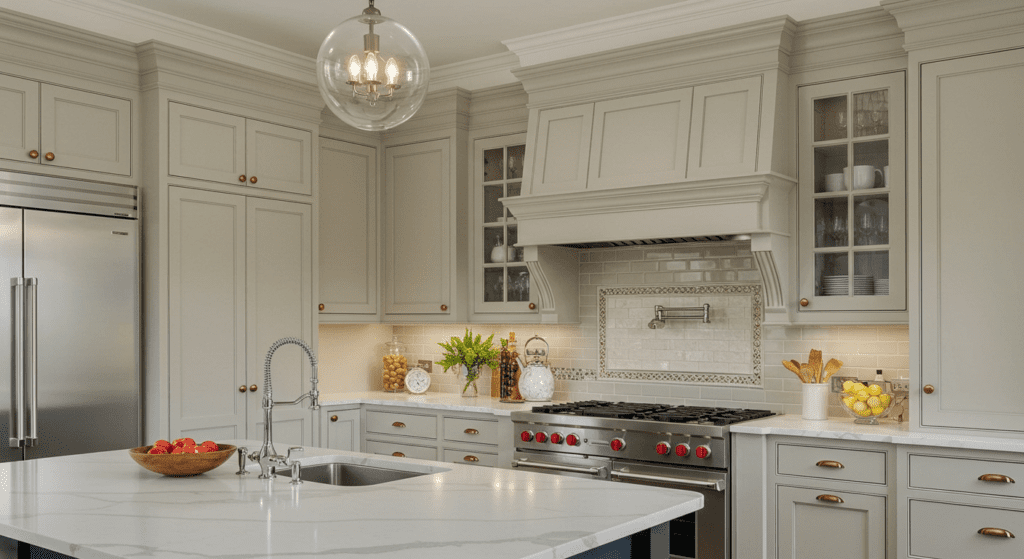Table of Contents
- Introduction
- Benefits of Cabinets with Ceiling-Height Molding
- Design Styles That Embrace This Trend
- How to Incorporate Ceiling-Height Molding in Your Kitchen
- Conclusion
- FAQs
Introduction
Cabinets with molding that extends to the ceiling have become a hallmark of elegant and timeless kitchen design. This approach not only enhances the visual appeal of your kitchen but also creates a sense of spaciousness and sophistication. Whether you’re renovating your kitchen or planning a cabinet makeover, this trend offers a perfect blend of functionality and style.

Benefits of Cabinets with Ceiling-Height Molding
1. Illusion of Height
By drawing the eye upward, ceiling-height molding creates the illusion of taller ceilings, making your kitchen feel more open and airy.
2. Seamless and Polished Look
This design eliminates the gap between the top of the cabinets and the ceiling, resulting in a cohesive and refined appearance.
3. Added Elegance
The extended molding adds a touch of sophistication, making it an ideal choice for homeowners seeking a high-end look without overwhelming the space.
4. Versatility in Design
This trend works well in various kitchen styles, from transitional to classic, offering flexibility in design choices.
Design Styles That Embrace This Trend
1. Transitional Kitchens
Transitional kitchens, which blend traditional and modern elements, benefit greatly from ceiling-height molding. It adds a classic touch while maintaining a contemporary feel.
2. Classic Kitchens
In classic kitchens, this design enhances the timeless appeal, creating a sense of grandeur and elegance.
3. Modern Farmhouse
For modern farmhouse kitchens, ceiling-height molding can add a touch of refinement while preserving the rustic charm.
How to Incorporate Ceiling-Height Molding in Your Kitchen
1. Choose the Right Molding Style
Select a molding style that complements your kitchen’s overall aesthetic. Crown molding is a popular choice for its versatility and elegance.
2. Match the Cabinet Color
Ensure the molding matches or complements the color of your cabinets for a seamless look.
3. Consider Proportions
Take into account the height of your ceilings and the size of your kitchen to ensure the molding doesn’t overpower the space.
4. Work with a Professional
Consulting a designer or contractor can help you achieve the perfect balance between functionality and aesthetics.
Conclusion
Cabinets with molding that extends to the ceiling are a timeless and elegant design choice that can transform your kitchen. By creating a seamless look and enhancing the sense of space, this trend is perfect for homeowners looking to add sophistication to their kitchens. Whether you prefer a transitional, classic, or modern farmhouse style, ceiling-height molding offers endless possibilities for customization.
FAQs
1. Does ceiling-height molding work in small kitchens?
Yes, it can make small kitchens feel larger by drawing the eye upward and creating the illusion of height.
2. What type of molding is best for ceiling-height cabinets?
Crown molding is a popular choice due to its versatility and elegant appearance.
3. Can I add ceiling-height molding to existing cabinets?
Yes, with the help of a professional, you can retrofit existing cabinets with ceiling-height molding.
4. Is this trend suitable for modern kitchens?
While it’s more common in transitional and classic kitchens, it can be adapted to modern designs with the right molding style and finish.